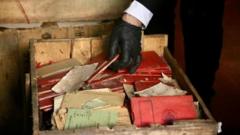The documents, linked to a clandestine shipment from Japan, may provide insights into Nazi propaganda and networks in South America.
Rediscovered Nazi Documents Spark Historical Inquiry in Argentina's Supreme Court

Rediscovered Nazi Documents Spark Historical Inquiry in Argentina's Supreme Court
Unearthed crates reveal long-hidden Nazi materials, shedding light on a dark chapter of Argentine history.
An intriguing discovery in Argentina has unveiled crates filled with Nazi documents located in the basement of the Supreme Court. This unusual revelation was made while workers were organizing the archives for transition into a newly established museum. Court officials traced the origins of the documents to a shipment sent by the German embassy in Tokyo, which arrived in Argentina on June 20, 1941, concealed in 83 diplomatic pouches on a Japanese steamship.
The identity of the documents was brought to light when Argentine customs officials intercepted several pouches containing Nazi propaganda materials, leading to their confiscation and subsequent placement in the Supreme Court later that same year. Discovery of the wooden crates occurred last week when workers stumbled upon a collection of old champagne crates while handling archival files.
According to a statement from the court, an inspection of one crate revealed materials aimed at promoting Adolf Hitler’s ideology within Argentina during World War II. The crates were promptly moved to a secure area, and the Buenos Aires Holocaust Museum was notified to assist with inventorying their contents. This includes a mix of black-and-white photographs and membership booklets marked with swastikas.
Historians are eagerly examining the potential of these materials to uncover the financial networks and international connections of Nazi operatives in South America. A statement from Argentina's Supreme Court detailed the information gathered thus far, noting that the controversial documents had been initially labeled as "personal effects" by German officials in Buenos Aires. However, customs officials, suspecting the potential impact on Argentina’s neutral stance during the war, opened five random pouches and found Nazi propaganda inside.
Against the backdrop of tensions surrounding World War II, the German embassy sought the return of the pouches to Tokyo, but in September 1941, an Argentine judge ordered them seized. The Supreme Court, responsible for determining the next steps, failed to act before Argentina severed ties with the Axis powers in 1944, resulting in decades of neglect for the crates.
In the years following the war, Argentina became a refuge for various high-ranking Nazis, including notorious figures like Adolf Eichmann and Josef Mengele, prompting an official apology from President Fernando de la Rúa in 2000 regarding the country’s facilitation of Nazi war criminals.



















